Cyberattacks keep evolving, and each new attack brings fresh techniques to fight back. Web applications power everything from online banking and e-commerce to healthcare portals and SaaS platforms. They help businesses work faster and stay connected, but they also create prime targets for cybercriminals. Web application penetration testing in the United States involves simulating cyberattacks on a web application to uncover security weaknesses before attackers exploit them. Cybersecurity professionals or specialized penetration testing firms usually perform these tests. They focus on finding flaws in authentication, authorization, session management, input validation, and API security stopping attackers before they strike.
This practice holds particular importance in the U.S. because strict compliance standards like PCI DSS, HIPAA, SOX, and CCPA demand that businesses protect sensitive data.
Here’s a guide on the Top 13 Web Application Penetration Testing Companies in the United States, along with what makes each of them stand out.
Top 13 Web Application Penetration Testing Companies in the United States
1. Astra Pentest
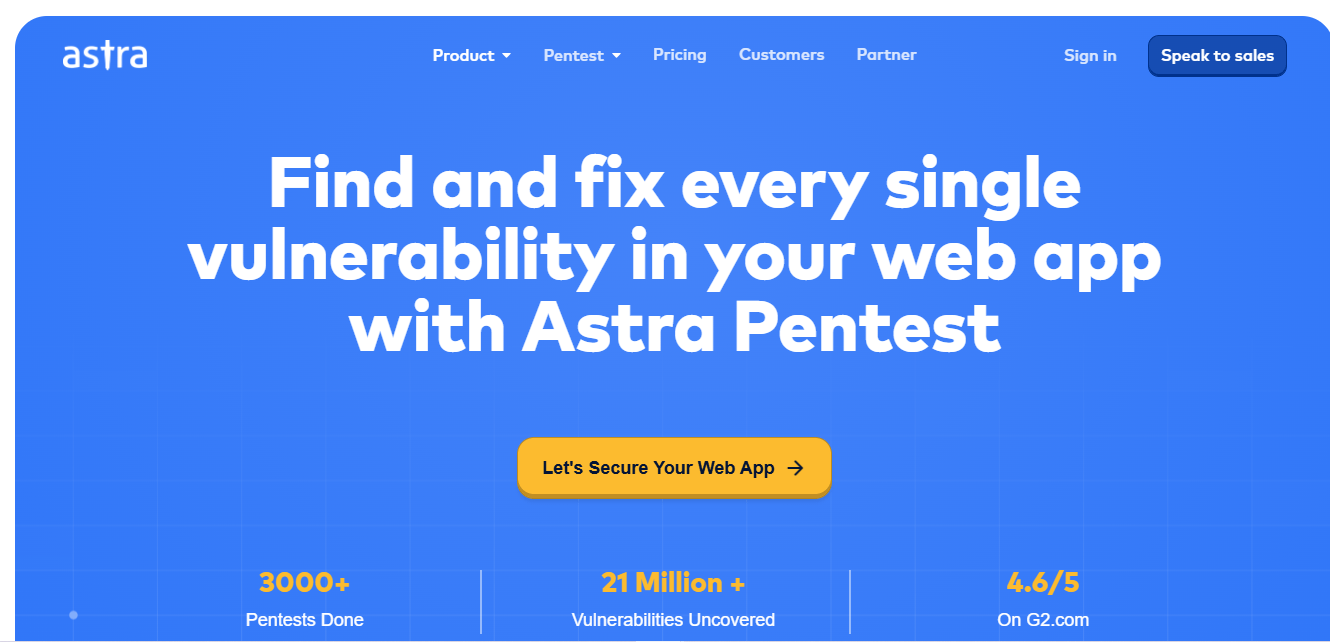
Astra Pentest offers a developer-friendly pentesting platform that combines automated vulnerability scanning with expert manual testing to eliminate false positives. Security experts manually review all findings to confirm their accuracy. Astra provides compliance tracking, real-time dashboards, and step-by-step remediation advice. It serves teams that need frequent security audits but want to avoid managing security infrastructure themselves.
Features
- Automated Scanner: Runs unlimited continuous scans.
- Manual Pentesting: Covers web apps, mobile apps, APIs, and cloud infrastructure.
- High Accuracy: Guarantees zero false positives through expert validation.
- Vulnerability Management: Includes an interactive dashboard for managing vulnerabilities dynamically.
- Compliance Support: Assists with PCI-DSS, HIPAA, ISO27001, and SOC2 compliance.
Pros
- Integrates easily into CI/CD pipelines.
- Eliminates false positives through expert manual verification.
- Covers vulnerabilities in cloud environments and APIs.
- Offers 24/7 customer support.
Cons
- Some users report experiencing false positives, causing extra work.
- Users have raised concerns about outdated vulnerabilities that are difficult to resolve.
Pricing
Starts at $199/month.
2. BreachLock
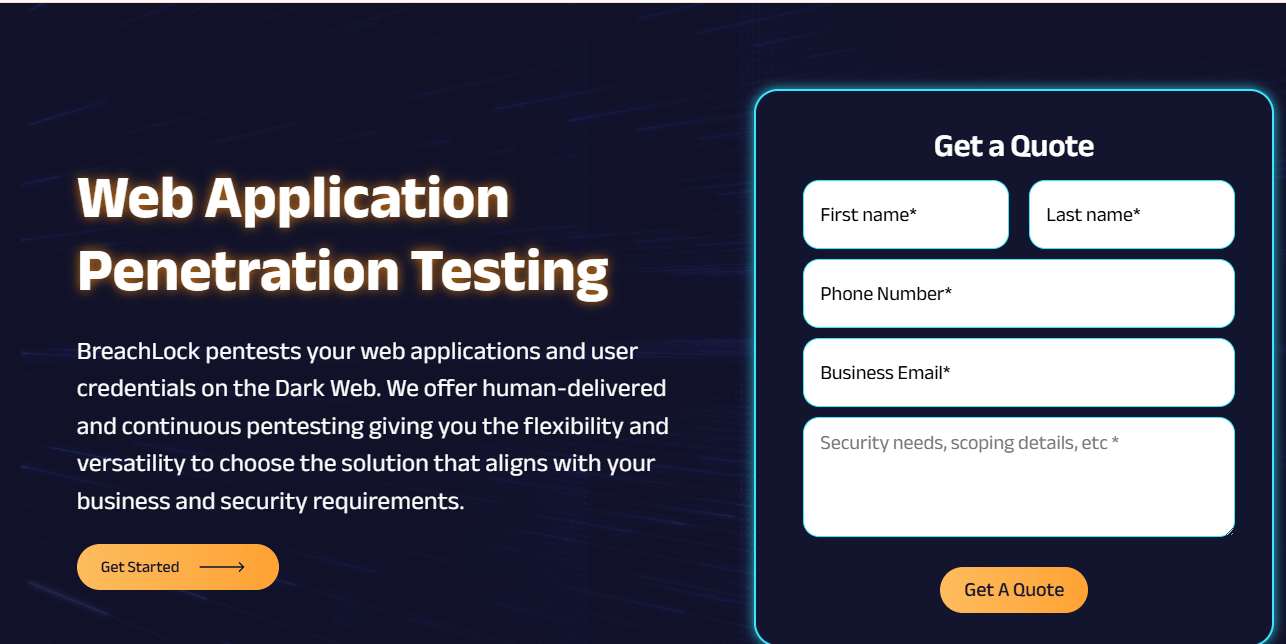
BreachLock penetration testing as a service (PTaaS) with a focus on comprehensive and ongoing security testing. It combines automated vulnerability scanning with manual validation by security experts. This hybrid model allows organizations to identify weaknesses and understand real-world attack scenarios more effectively.
Features
- Automated Scanning: Uses automated tools to detect common vulnerabilities and security gaps.
- Manual Penetration Testing: Security experts validate automated results and perform deeper manual testing, including controlled exploitation attempts.
- Continuous Testing: Provides ongoing vulnerability assessments to catch new threats as they appear.
- Reporting and Remediation: Offers detailed reports and recommendations to fix identified security issues.
Pros
- Hybrid Testing Model: Balances efficiency with accuracy by combining automated scans with expert-led manual testing.
- Expert Validation: Ensures accurate findings and reduces the risk of missing critical vulnerabilities.
- Ongoing Testing: Keeps security posture up to date by detecting new threats continuously.
Cons
- High number of false positives.
- Poorly designed user interface.
- Reports lack clarity and detail.
Pricing
Pricing is available upon request.
3. Cobalt
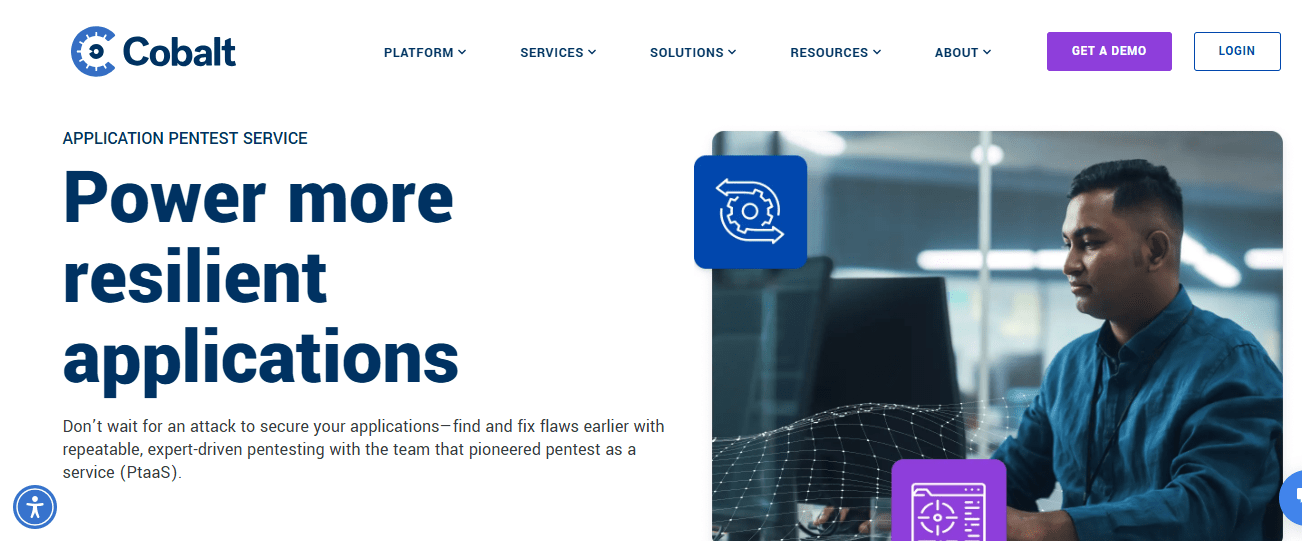
Cobalt is a penetration-testing-as-a-service provider that connects organizations with a global community of vetted penetration testers. These testers match your organization’s tech stack and conduct focused security assessments. Cobalt offers a SaaS platform with real-time insights, allowing security teams to act on vulnerabilities faster. The service includes web application pentesting, mobile app pentesting, cloud scanning, and API pentesting.
Features
- Global Pentester Community: Connects you with skilled, vetted penetration testers worldwide who match your technology requirements.
- Collaboration Platform: Enables direct communication between clients and pentesters with tools for issue tracking, status updates, and progress monitoring.
- Reporting and Remediation Support: Provides clear reports and actionable guidance to address identified vulnerabilities.
Pros
- Efficient Communication: Facilitates direct interaction with testers, helping teams stay updated on findings and actions.
- Access to Specialized Skills: Offers penetration testers with varied expertise for different types of security assessments.
Cons
- Potential Report Inaccuracies: Some users report occasional errors in vulnerability findings.
- Limited Testing Depth: Testing may not always meet the depth expected for complex systems.
Pricing
Contact Cobalt for a demo and pricing details.
4. Intruder
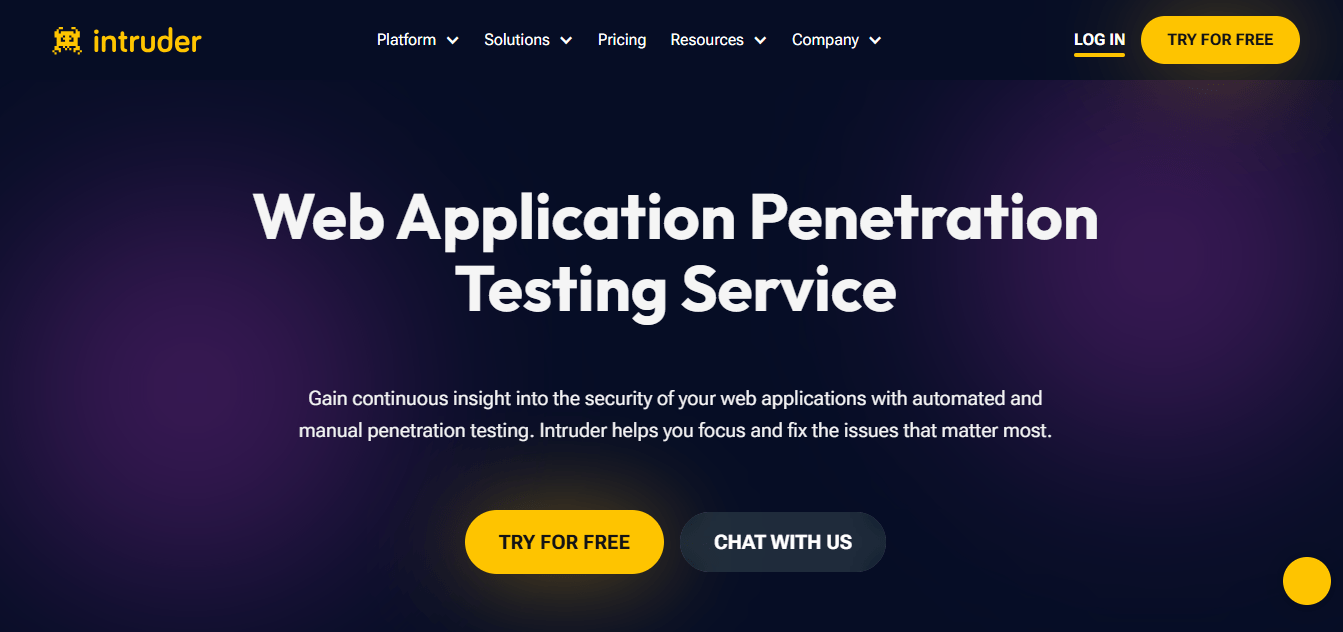
Intruder provides automated vulnerability scanning and attack surface management to help businesses secure their digital assets. The platform continuously tests web applications, APIs, cloud setups, and external infrastructure for weaknesses. It runs automated scans on networks, systems, and applications, detects potential risks, and alerts teams to take action. Intruder connects with existing workflows and delivers ongoing monitoring to maintain security over time.
Features
- Attack Surface Management: Continuously monitors networks to detect exposed services and vulnerabilities.
- Automated Vulnerability Scanning: Scans infrastructure, web apps, and APIs and automatically triggers scans when it detects changes or new threats.
- Continuous Network Monitoring: Provides 24/7 visibility into network activity and potential risks.
- Web Application and API Scanning: Identifies vulnerabilities in both authenticated and unauthenticated web applications and APIs.
Pros
- Highly Scalable: Automated scanning makes it easy to cover multiple environments.
- Ongoing Monitoring: Regular testing detects new vulnerabilities quickly and helps reduce security gaps.
- Strong API Testing: Offers in-depth API testing for one of the most common attack points.
Cons
- Can be expensive
- May have licensing issues
- Some users report limited features
- Setup can be complex
Pricing
- Essential: $99/month
- Cloud: $180/month
- Pro: $240/month
- Enterprise: Custom pricing
5. Secureworks
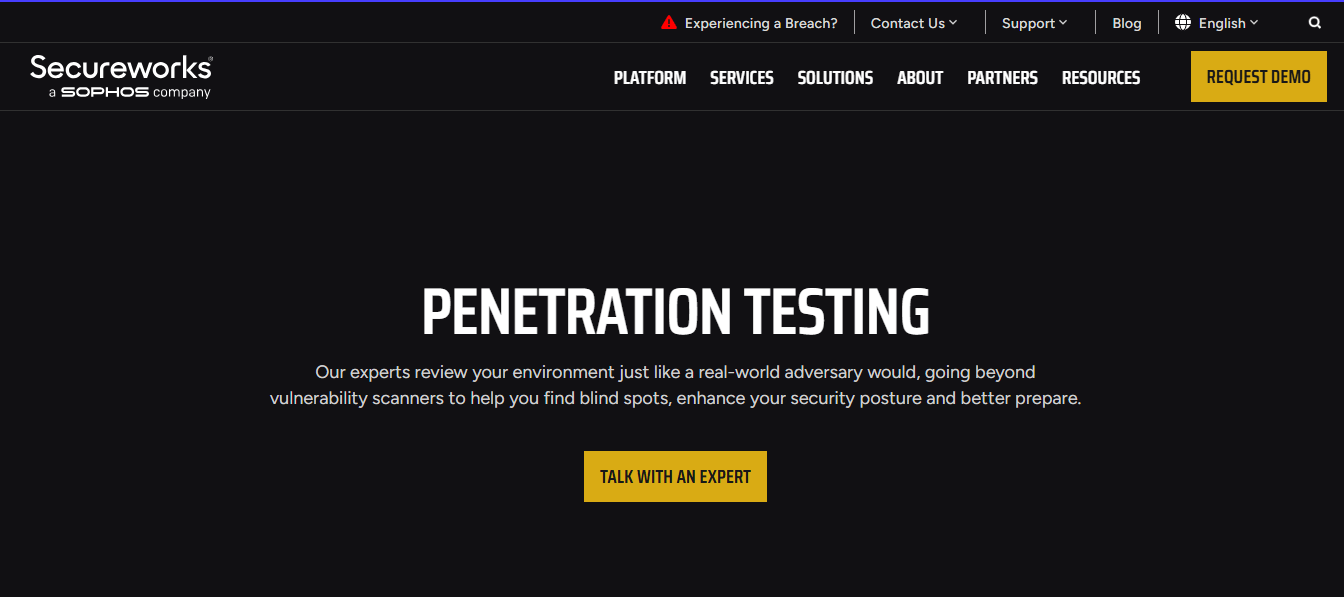
Secureworks offers a comprehensive portfolio of penetration testing services that help organizations find security gaps and weaknesses before attackers exploit them. The service uses an adversary-focused approach, going beyond basic vulnerability scans. Secureworks simulates real-world attacks including external threats, insider threats, wireless exploits, and physical breaches to uncover blind spots in an organization’s security posture. The service not only identifies vulnerabilities but also shows what attackers could do after gaining access, such as pivoting through networks, exploiting systems further, and compromising data.
Features
- External Penetration Testing: Tests the security of internet-facing assets.
- Specialized & Custom Work: Performs tests designed for specific business needs.
- Threat Modelling & Scenario-Based Testing:Simulates realistic attack scenarios based on likely threats.
- Expertise and Intelligence: Uses security experts with up-to-date threat intelligence.
Pros
- Realistic simulation of potential attacks
- Thorough coverage of multiple attack vectors
- Clear, actionable reporting for technical and executive teams
- Customizable testing scenarios for different organizations
Cons
- Can be expensive and time-intensive
- Requires internal teams to act on remediation recommendations
Pricing
Pricing is available directly from Secureworks’ sales team.
6. Defendify
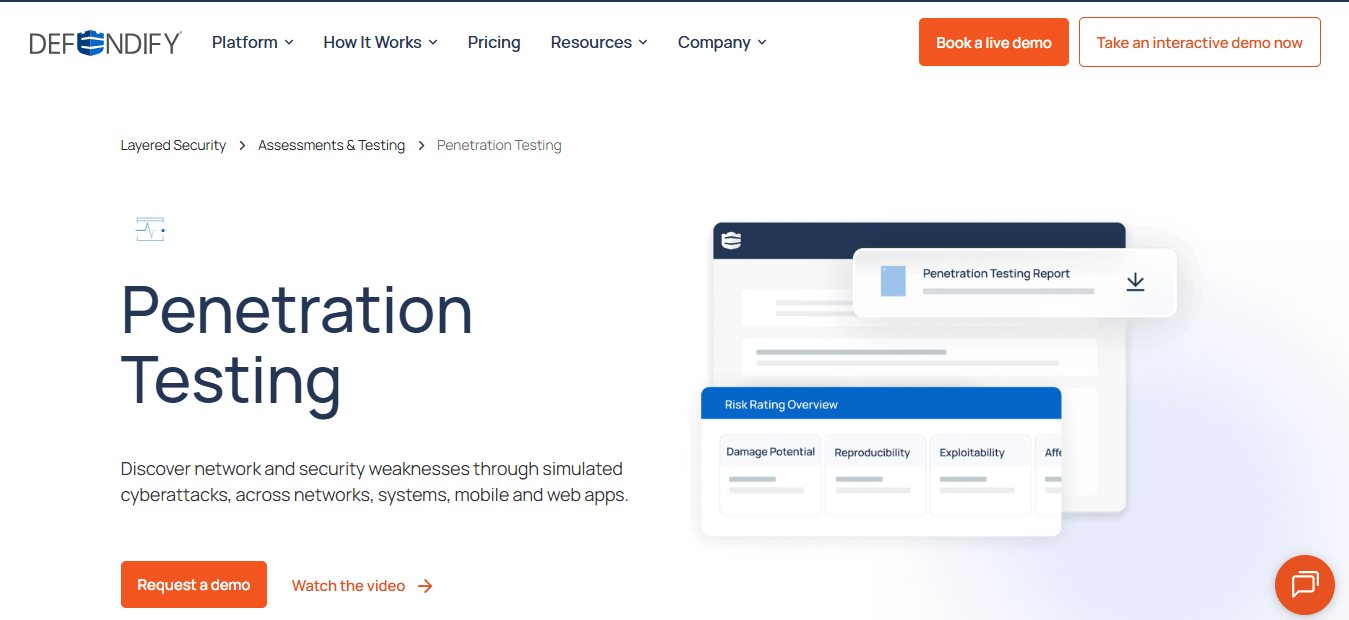
Defendify’s Penetration Testing gives organizations a proactive, human-driven method to simulate real-world attacks, uncover vulnerabilities, and improve their security posture. This service sits within Defendify’s Layered Security approach under its Assessments & Testing suite. Expert ethical hackers combine manual testing techniques with advanced tools to show how attackers could breach networks, internal systems, and web or mobile applications. Unlike automated scans, Defendify focuses on a human-powered approach, delivering a deeper and more realistic evaluation of an organization’s security defenses.
Features
- Human Expertise: Ethical hackers manually search for weaknesses that automated scanners might overlook.
- Advanced Techniques: Skilled testers replicate real-world attack methods to expose hidden risks.
- Customizable Testing Options: Organizations can select the areas and systems they want tested.
- Comprehensive Reporting: Each test includes detailed findings with risk ratings, prioritized remediation steps, and actionable recommendations.
Pros
- Company-Specific Risk Assessment: Penetration tests focus on the organization’s actual infrastructure, applications, and operational setup, ensuring relevant and effective security improvements.
- Easy Scheduling: Defendify’s platform makes it simple to plan tests and retests.
- Safe Testing: Tests identify vulnerabilities without disrupting operations, corrupting data, or reducing system performance.
Cons
- Scope Limitations: Testing only covers the systems and areas included in the agreed-upon scope, leaving other potential vulnerabilities untested.
- False Sense of Security: Passing a penetration test does not guarantee total protection against future attacks.
Pricing
The price and duration of a penetration test depend on factors such as environment size, system complexity, and testing scope.
7. Metasploit
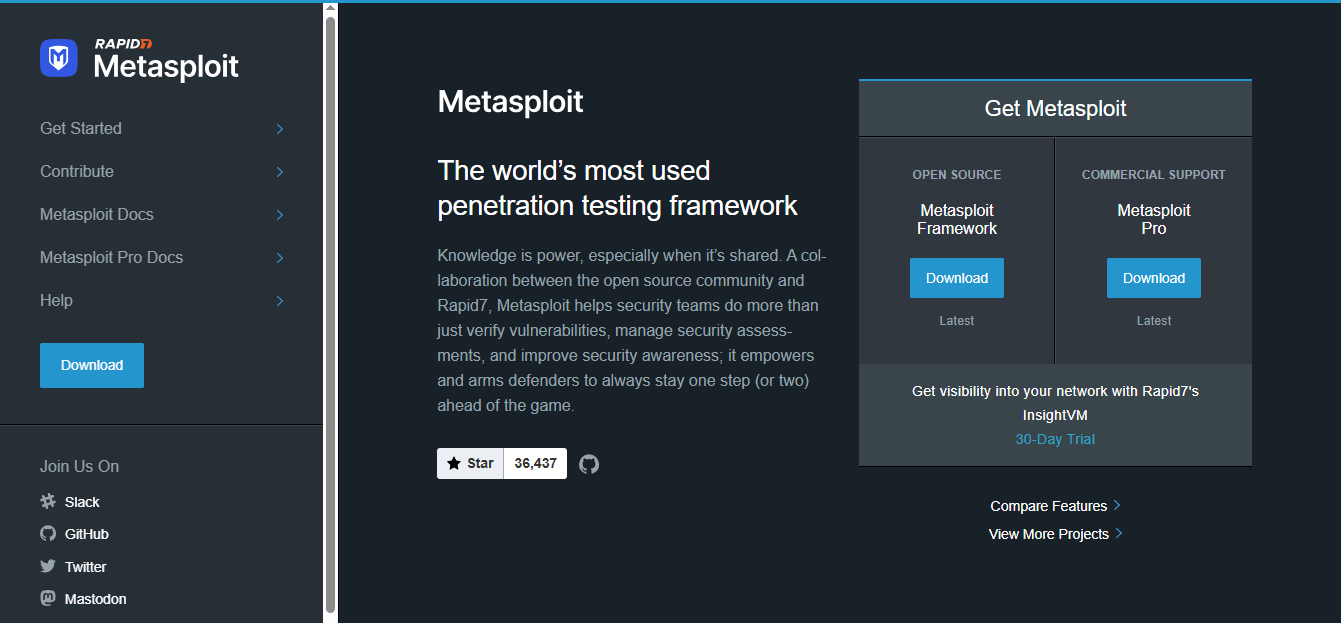
Metasploit helps security professionals and researchers systematically discover, validate, exploit, and fix vulnerabilities in networks, systems, and applications. It offers a large library of exploits, payloads, encoders, auxiliary modules, and post-exploitation tools. Users can work through command-line or GUI/web-based interfaces. The framework also includes fuzzing tools, anti-forensics utilities, and evasion features with listeners, encoders, and post-exploitation code. It installs easily and runs on multiple platforms, regardless of the underlying programming language.
Features
- Extensive exploit library and payloads
- Modular architecture for flexible use
- Automation workflows for faster testing
Pros
- Extensive exploit and payload ecosystem
- Suitable for both manual and automated testing
- Active community with frequent updates
Cons
- Difficult for beginners to learn
- Navigation can feel complex at first
Pricing
Contact for pricing.
8. Qualysec
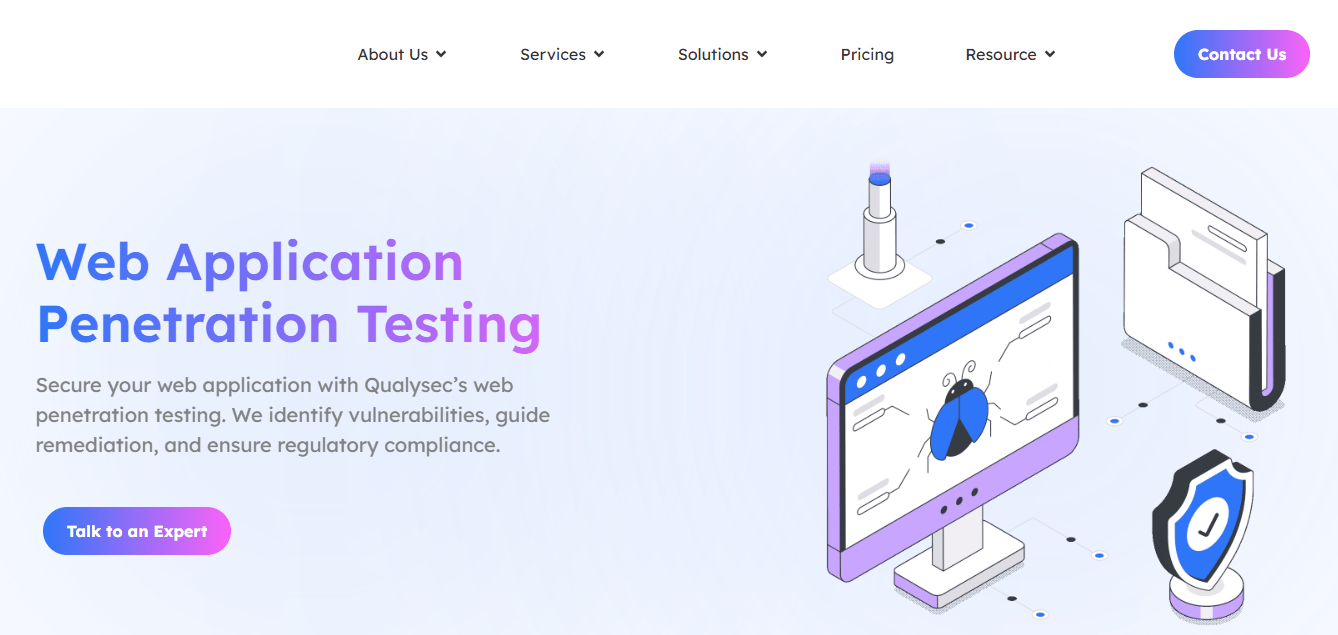
Qualysec Technologies delivers penetration testing services across the USA and is known for its expertise in finding vulnerabilities before attackers exploit them. The company tests applications, networks, clouds, and APIs to help businesses stay ahead of constantly evolving cyber threats. Its approach combines automated testing with hands-on manual testing to provide thorough and reliable security solutions.
Features
- Process-Based Hybrid Testing Solution: Combines automated and manual testing to detect vulnerabilities comprehensively.
- Industry Compliance Support: Helps businesses meet key security standards, including PCI-DSS, SOC 2, HIPAA, GDPR, and ISO 27001.
- Detailed Remediation Instructions: Provides clear, step-by-step guidance for fixing identified vulnerabilities.
- Custom Testing Methodologies: Designs security testing methods specific to each client’s application and infrastructure.
Pros
- Conducts thorough, multi-phase testing to uncover a wide range of vulnerabilities.
- Includes verification to ensure remediation efforts are successful.
- Supports compliance with well-known security and data protection regulations.
Cons
Costs can increase depending on the level of access and depth of testing required.
Pricing
Contact Qualysec Technologies directly for pricing information.
9. Invicti

Invicti is a web application security platform that enables organizations to detect and fix vulnerabilities in their web applications and APIs. It uses automated scanning combined with proof-based vulnerability testing to minimize false positives. The platform connects directly with development workflows, ensuring continuous security testing throughout the software development lifecycle.
Features
- Web Application and API Discovery: Detects all web applications and APIs, including forgotten or hidden assets.
- API Security Testing: Performs built-in API discovery and vulnerability scanning for web applications and APIs.
- Automated Security in SDLC: Runs security checks automatically during the software development lifecycle, reducing the need for manual testing.
- DAST and IAST Scanning: Uses both dynamic and interactive scanning to find a wider variety of vulnerabilities.
- Proof-Based Vulnerability Scanning: Confirms vulnerabilities with verifiable proof, helping teams focus only on real issues.
Pros
- Offers versatility and ease of use.
- Integrates well with development workflows.
- Provides user-friendly reports.
Cons
- Upgrades can be difficult.
- Customer support is reported as inadequate.
Pricing
Pricing is available upon request.
10. Veracode
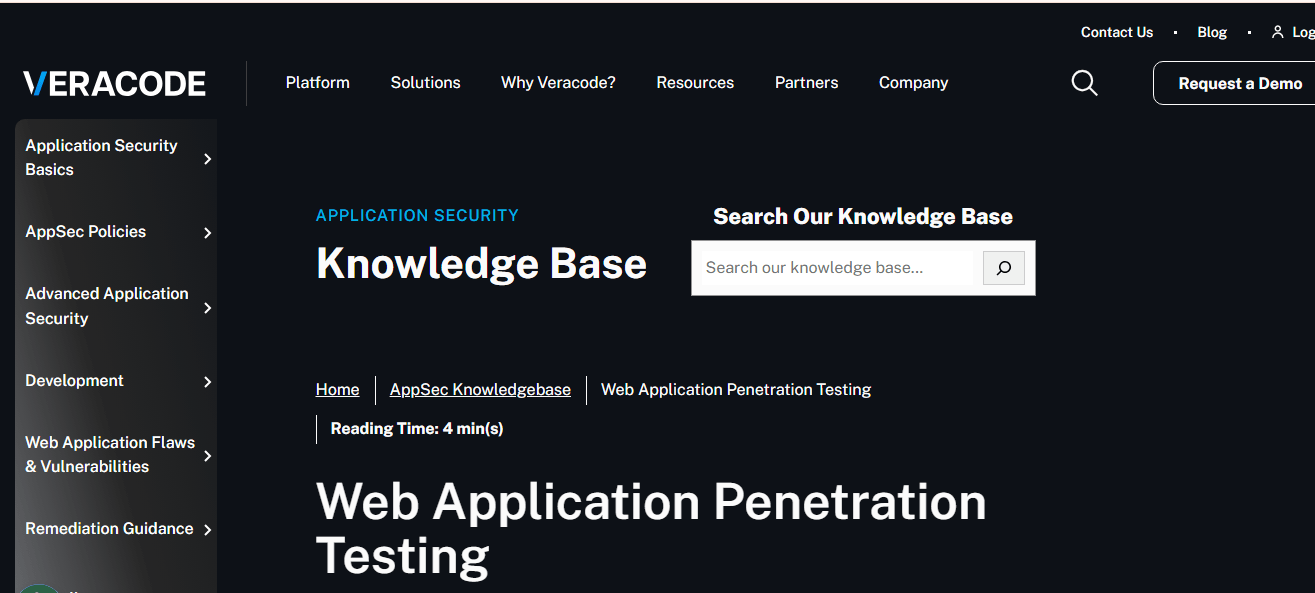
Veracode delivers enterprise-class application security designed for DevOps teams who want to integrate security early in the development process. It offers Static Analysis, Dynamic Analysis, Software Composition Analysis, and API Scanning. Its SaaS platform automates security feedback and works seamlessly with development technologies, ensuring high accuracy and extensive coverage.
Features
- Scanner Capacity: Web applications
- Manual Penetration Testing: Available
- Accuracy: May produce false positives
- Vulnerability Management: Supported
- Compliance: Meets NIST, PCI, OWASP, HIPAA, and GDPR requirements
Pros
- Delivers quick penetration testing services
- Provides highly detailed and comprehensive reports
- Offers remediation assistance to guide teams in fixing vulnerabilities
Cons
- Cannot guarantee zero false positives
- User interface could be more intuitive
Price
Quote available upon request.
11. Aikido Security
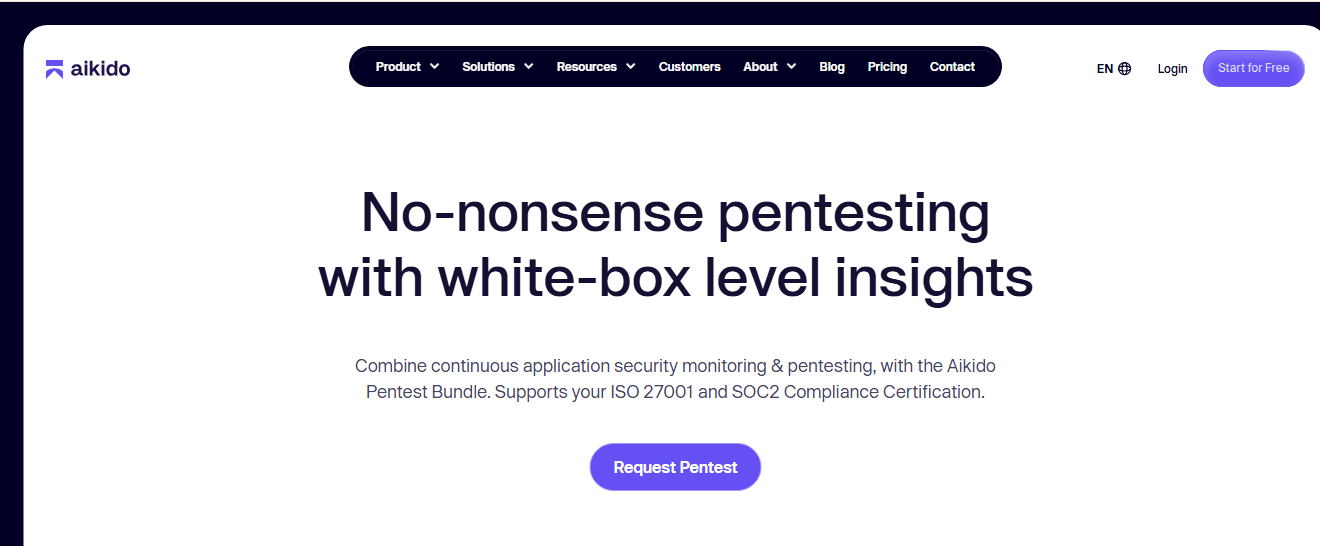
Aikido Security is an all-in-one security platform that protects your code, cloud, and runtime environments. It integrates multiple security tools into a single system, helping teams detect and fix vulnerabilities quickly and automatically. Aikido Security supports the entire software development lifecycle (SDLC), from code creation to runtime, ensuring consistent security across every stage.
Features
- Black-Box Testing (DAST): Simulates real-world attacks on your web applications and APIs without requiring source code access, helping you identify external threats.
- Authenticated DAST: Logs in as a user before scanning, uncovering hidden vulnerabilities and providing a more complete security assessment.
- Code Scanning & Cloud Vulnerability Assessment: Monitors codebases and cloud infrastructure for security issues and flags them for remediation.
- Centralized Security Dashboard: Consolidates all findings into one platform, giving your team a clear view of vulnerabilities and their status.
Pros
- AI-powered autofix reduces false positives by up to 85%.
- AI Autotriage and AI Autofix help quickly address and prioritize issues.
- Deep integration with development tools (IDEs, task managers, CI/CD pipelines).
- Automates compliance tasks for security standards.
Cons
Lack of clarity on available cloud security controls without completing the cloud setup.
Pricing
- Forever Free Plan – No cost
- Basic: €300/month (includes 10 users)
- Pro: €600/month (includes 10 users)
- Advanced: €900/month (includes 10 users).
12. Acunetix
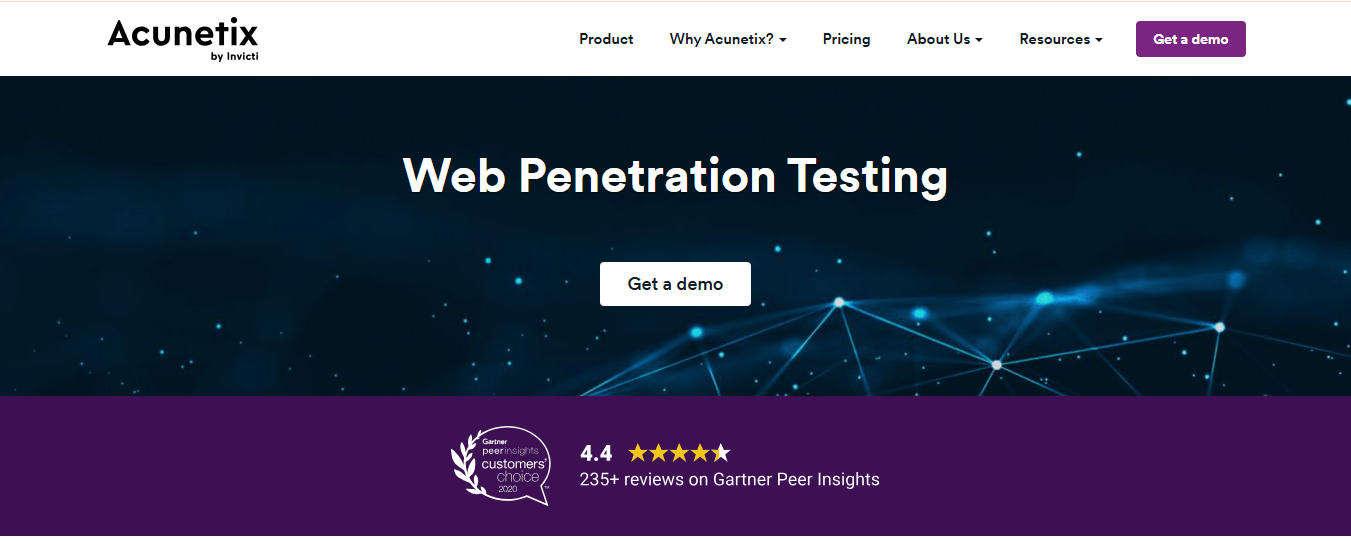
Acunetix is a powerful web application and API security scanner that helps organizations automate application security testing. It detects vulnerabilities in websites, web applications, and APIs without interrupting development workflows.
Features
Simulates real-user interaction with JavaScript-heavy web applications to test even the most complex components.
Includes a Login Sequence Recorder (LSR) that lets users record actions and restrictions, then replay them to authenticate and test pages requiring login credentials.
Automatically discovers APIs and performs security testing to identify vulnerabilities early.
Pros
Releases updates promptly to address emerging threats.
Detects a wide variety of vulnerabilities effectively.
Supports agile testing by generating detailed, actionable reports.
Cons
- Does not offer expert remediation support from security professionals.
- Cannot guarantee zero false positives in its findings.
Pricing
Contact for pricing
13. Nessus
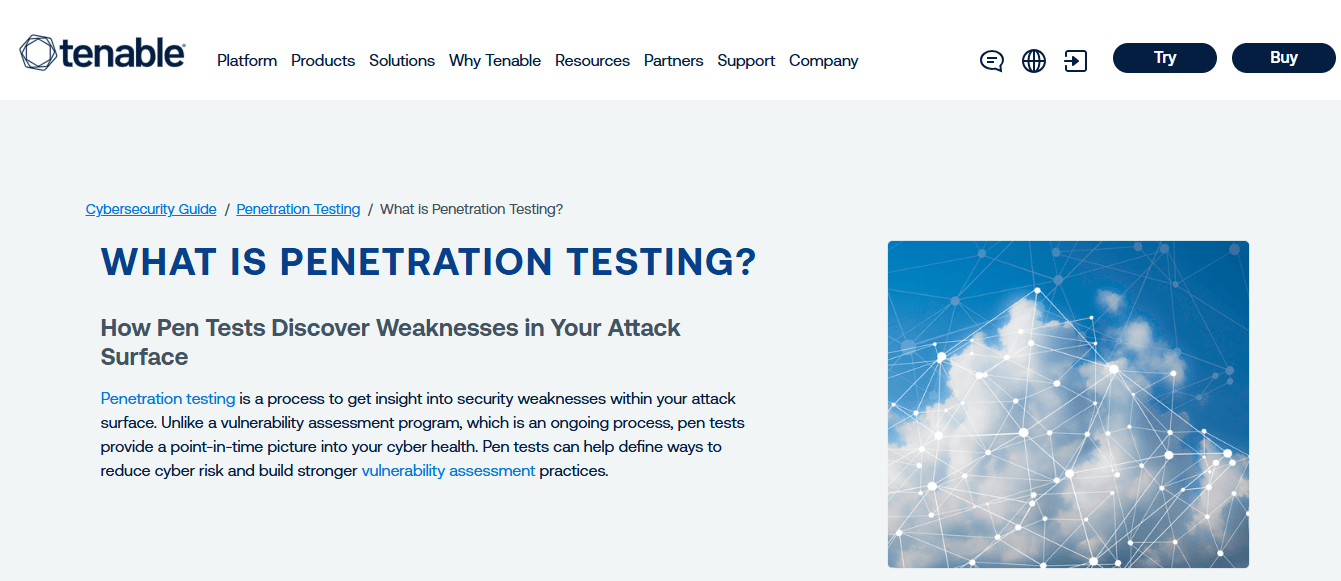
Tenable Nessus is a vulnerability assessment tool that identifies and prioritizes security weaknesses across IT assets. It scans networks, operating systems, and applications, then generates detailed reports that help organizations understand their security posture and fix vulnerabilities. You can deploy Nessus on multiple platforms, making it flexible for different environments. Its intuitive interface and automated scanning and reporting make it a top choice for web application penetration tests.
Features
- Vulnerability assessments: Perform scans across operating systems, devices, and applications without limitations.
- Automated assessments: Schedule and run point-in-time scans to detect software flaws, missing patches, and misconfigurations.
- Customizable reports: Generate detailed reports for configuration checks, compliance audits, and security reviews.
- Web application and cloud scans: Scan web applications, external attack surfaces, and cloud environments.
- Continuous updates: Access regularly updated vulnerability data to stay protected against new threats.
Pros
- Detects missing patches crucial for maintaining security.
- Provides point-in-time analysis of systems to reveal vulnerabilities.
- Supports compliance efforts through detailed scan reports.
Cons
- Advanced support requires additional payment.
- Scan completion can take a significant amount of time.
Pricing
Contact sales for pricing details.
One tiny vulnerability can open the door to a big security nightmare, costing money, trust, and time to recover. The 13 web application penetration testing tools we’ve highlighted are among the best in the United States, known for their ability to uncover real-world attack paths, provide clear remediation guidance, and help organizations meet compliance requirements. Partnering with the right penetration testing provider allows you to secure your digital assets, maintain customer trust, and stay ahead of evolving threats.

